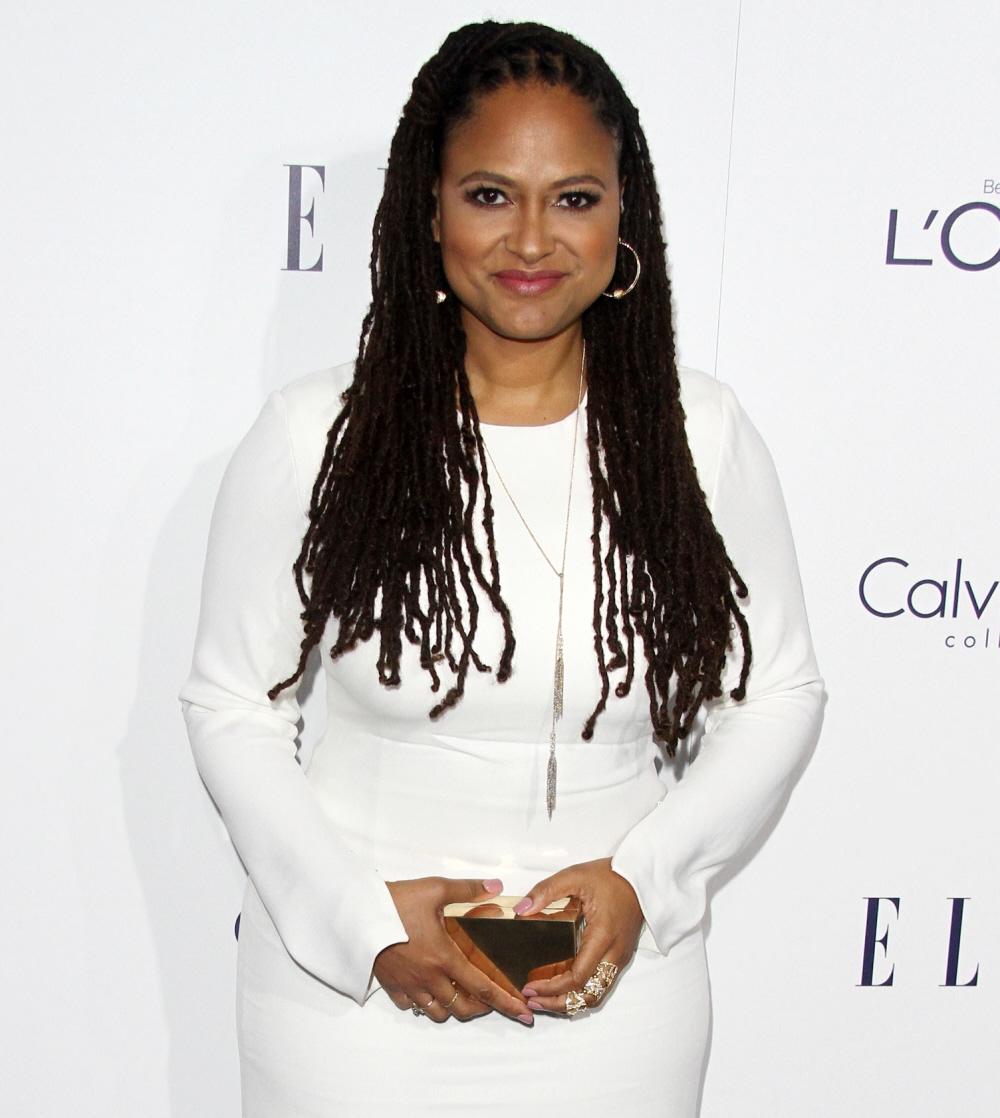I’m still mad that Ava DuVernay didn’t get more awards-season recognition for Selma last year. I know the critics will nit-pick the film and her work, but what I always come back to is this: during the same awards cycle, Morten Tyldum got an Oscar nomination for Best Direction for The Imitation Game. Was TIG a decent movie? Sure. Did Benedict Cumberbatch deserve an Oscar nomination? Sure. But it was a completely by-the-books bio-pic and costume drama, and because Tyldum turned in a mediocre-but-forgettable film, he was celebrated and awarded. While DuVernay turned in a brilliant but flawed film and she was shunned, and her work denigrated.
So, Ava is currently at Sundance and she was asked all about #OscarsSoWhite, diversity, representation and more. Here’s what she said:
On the word “diversity”: “We’re hearing a lot about diversity. I hate that word so, so much. I feel it’s a medicinal word that has no emotional resonance, and this is a really emotional issue. It’s emotional for artists who are women and people of color to have less value placed on our worldview.”
It’s a belonging issue: “There’s a belonging problem in Hollywood. Who dictates who belongs? The very body who dictates that looks all one way. Change has to happen, it has to happen with the people who dictate who belongs. It’s disconcerting to hear people say that shouldn’t change. That’s the very reason it should.”
I completely agree with her. I use “diversity” as a shorthand for larger concepts of #OscarsSoWhite, the lack of actors of color during the awards season, the different standards artists of color are held to, and how the screwed up way the white, male-dominated power structure operates. But she’s right – it’s a belonging issue. And it goes beyond film and art too, and you can look no further than the way many people have “other-ized” Pres. Barack Obama. Black artists and artists of color especially are seen as foreign, other, not-included in the white power structure of Hollywood. It’s not simply diversity for representation’s sake, although some fundamental changes in diversity and representation need to happen on the surface at the very least. But Ava is right – it’s a belonging issue. Who belongs, who doesn’t. Who gets to determine who belongs to that elite group.
Photos courtesy of Fame/Flynet and WENN.
















Did she mean clinical…?
Medicinal as in “take your medicine” ie. something you don’t want to do but are forced to do. The extract above skips a bit but she said she liked ‘inclusion’, which has more positive connotations.
I’m probably in the minority here but I think Ava has come over like a bitter woman with a chip on her shoulder during this whole Oscar debate. I also think her career is now over in Hollywood. I just can’t see many people wanting to hire her now. She has made a lot of enemies. From what I’ve read of other directors critiquing Selma there were a lot of flaws in her directing of that movie which is why she wasn’t nominated. Yet she preferred to blame it on her race. There are other much better black directors out there without the bad publicity she has created for herself.
@Petra – you’re right, You’re in the minority,
“Black artists and artists of color especially are seen as foreign, other, not-included in the white power structure of Hollywood. ”
Non-English speaking artists are also seen as foreign. Hence the Best Foriegn Language Film category. Guess they’re not included in the white, English speaking, power structure of Hollywood either.
Not equivalent
Can you expand on that?
Sure foreign films is anything created from a different country ie not an American company. Because the academy is an American entity. Much like UK, France, etc have their own film recognition. They aren’t being discriminated against and they can be nominated for any of the main categories. Its also to highlight the work from other countries that may not get their films out there otherwise
For POC they are being shut out in their own country and their own film governing body. They are FROM the US aka not foreign. This is a simplification but the comparison isn’t equivalent
Nick/Ennie/Dangles/GNAT: The academy may have started out as an American institution, but it is the top body of the film making industry. Other Oscar categories can showcase non American artists/films, and the much despised voters aren’t strictly American or live in America.
This misconception about the foreign film category starts with the shorthand name or what it used to be called and isn’t any more. i’m as guilty as the next person in using the shorthand, BUT it’s proper name is BEST FILM IN A FOREIGN LANGUAGE emphasis language, not foreign-ness. BAFTA have made this category easier to understand by calling it BEST FILM NOT IN ENGLISH LANGUAGE.
Their being in a foreign language doesn’t remove their eligibility for nomination in other categories.
In the past 15yrs, off the top of my head, these films received nominations in Foreign language category and or in other categories.
AMOUR [2012] – French language [France]
other Categories nominations: Best Picture, Best Actress, Best Original screenplay, Best Director
BIUTIFUL [2011] – Spanish Language film [Mexico/Spain]
other category nominations: Best Supporting actor
VOLVER [2006] – Spanish Language film [ spain]
other category nominations: Best Supporting actress
*PERSEPOLIS [2007] – French/Iranian/German Language [France/USA film]
other Category nominations: Best Animated Feature
*BELLEVILLE RENDEVOUS [2003] – French Language [France film]
other Category nominations: Best animated Feature and Best Song
*HABLA CON ELLA [2003] – spanish language [spain]
other category nominations: Best Director, Best Original screenplay
*SPIRITED AWAY [2002] – Japanese language [Japan]
other Category nominations: Best Animated Feature
CROUCHING TIGER HIDDEN DRAGON [2000] – Mandarin Language [China/Taiwan]
Other category nominations [TEN altogether]: Best Film, Best Director, Best adapted screenplay, Best Cinematography, Best Original score, Best art Direction, Best costume, Best Editing, Best Song
LIFE IS BEAUTIFUL [1996] – italian language [Italy film]
other category nominations: Best Picture, Best Director, Best Actor, Best original screenplay, Best Score,Best Editing
*not nominated for Best Foreign film, but nominated elsewhere.
Also, the foreign film category isn’t nominated by the artists of the country they come from. it’s the country that submits the films they want considered. Some years there are really good films that could potentially be nominated, but if they aren’t the official selection of their govts, they do not get nominations.
I don’t understand your point, I’m sorry.
The point is that non-English speaking films are called foreign and are segregated from the English speaking ones. Why?
Ok, sorry. I’m slow this morning.
but why not?
I sometimes wish that when some great foreign language movie is wonderful that it’d get nominated. It could happen, I guess.
Edit: +there have been some like Amour, As Goldie said under this post.
But I do not think that there is really a reason or obligation for the Academy to do it. Maybe if the movie was American produced or had native american language, then, I’d understand.
It is open to foreign films, and actor of other nationalities and languages. already, it does not only recognize American only or American- and other countries productions.
(notice I and not mentioning ethnicity, I do not thing language=ethnicity at all)
.
I understand their importance because the awards are so famous, but if they want to keep them separated I don’t see why not. I am foreign, I speak a foreign language and in my country we have a ceremony for movie awards. I would not like to see foreign language movies winning over movies in the language of my country, again, maybe if they were produced by my country or spoke original languages.
These awards are from a certain country, they promote and award their industry, the movie industry of that country, they are not organized by the world. I wish they were more open to what the ethnicity in their country is.
Going out of topic:
In the USA, besides “whites”, there are many people of mestizo origin, Spanish speaking white people, African American, people from different countries in Asia. I worry at thinking at quotas. First there must be a change in the production of movies and a change on what people choose to pay for. Do people all over the world pay to see diverse movies? How many good quality films, quality characters are being written and highlighted by producers? Do casting directors get those diverse actors in films? Is there a good pool of them to choose nominations?
USA has this huge problem, but the entertainment industry all over the world is very, very flawed. Someone was saying the other day. In music Americans go to Korea to sing K-pop, older women do not get roles, Mexicans or otherwise do not get to act in films in characters of their own ethnicity, in India (and many Asian countries) they prefer fairer actors, hey even in my country the weather people who used to be actual men and women meteorologist are now “read” by young shapely women in tight short dresses. Ratings and culture are a good excuse for producers.
“Maybe if the movie was American produced or had native american language, then, I’d understand.”
The films are supposed to be nominated on merit. Not nationality.
“It is open to foreign films, and actor of other nationalities and languages. already, it does not only recognize American only or American- and other countries productions.
(notice I and not mentioning ethnicity, I do not thing language=ethnicity at all)”
So you think it’s not ok to exclude people based on ethnicity. But it is ok to exclude people based on the language they speak?
“These awards are from a certain country, they promote and award their industry”
Not true. They’ve also recognized films from other English speaking countries like Australia and England more often than they’ve nominated non-English speaking films.
“First there must be a change in the production of movies and a change on what people choose to pay for”.
So by that logic the nominees should be the top ten films at the box office.
“Foreign films can be nominated for best picture. For example, Amour is a French film that won best foreign film and was nominated for best picture. It’s rare but it does happen. While it would be great to see more foreign films nominated for best picture, I think it’s good to have a foreign film category as it brings more attention to films that otherwise wouldn’t be on many Americans’ radar.”
I know they can be nominated. But they aren’t nominated often enough. Why have a foreign language language film category to promote non-English speaking films? The Academy could still go through the same process to select what they think are the five best non-English speaking films and include them in the Best Picture category. That would bring even more attention to films “that otherwise wouldn’t be on many American’s radar.
“CROUCHING TIGER HIDDEN DRAGON still holds the record for highest number of nominations for a foreign language film. 10 in total. which is better than many films in any year. I think LIFE IS BEAUTIFUL is a close second because it was nominated for 6 awards. Both films received nominations in the big categories of Best picture, director, actors and screenplay.”
So that’s two films you’ve named. What about the scores of quality non-English speaking films that have been ignored. Check out the past winners of the Palm d’Or. How many of them have failed to get a nomination for Best Picture at the Oscars? You’re seriously going to argue that the Academy are correct when they assume the non-English speaking films are inferior to English speaking films just because they’re in another language?
“The Award is not without controversy. One point of contention is the lack of consideration of non-English language films for Best Picture. To date, only nine foreign language films have been nominated in the category”
So in the history of the Academy awards only nine non-English speaking films have been worthy of a nomination? Come on!
“If the USA doesn’t have an official language, how can there be an Academy Award for Best Foreign Language Film Award? Oh, they’re a bunch of racists. Sorry, seem to have answered my own question.”
You might be on to something.
@Dangles, Foreign films can be nominated for best picture. For example, Amour is a French film that won best foreign film and was nominated for best picture. It’s rare but it does happen. While it would be great to see more foreign films nominated for best picture, I think it’s good to have a foreign film category as it brings more attention to films that otherwise wouldn’t be on many Americans’ radar.
+1
Awesome film. I just cannot see it. I think there shave been other years where outstanding foreign language films make it to the best film nominations.
I did not recall any in particular when I wrote my former post.
I wish they were also open to nominate actors like Andy Serkis, who usually acts for computer generated characters, or even choose Animated films for Best films, not just keeping them in their own category.
CROUCHING TIGER HIDDEN DRAGON still holds the record for highest number of nominations for a foreign language film. 10 in total. which is better than many films in any year. I think LIFE IS BEAUTIFUL is a close second because it was nominated for 6 awards. Both films received nominations in the big categories of Best picture, director, actors and screenplay.
Ennie: Animated films have been nominated for Best film. see BEAUTY AND THE BEAST. nominated in 1991. Won Best song and Best Music score that year.
There was a kerfuffle in 2008 with WALTZ FOR BASHIR an animated film from Isreal because it received alot of support to be nominated for Best film rather than Best Animated category. in the end it was nominated for Best Foreign film and it won.
Thank you, you are so knowledgeable! I did not do research beforehand. Maybe I am just bummed because my favs studio Ghibli movies still have to get noms for Best films 😉
I loved The lion king, now that is a disney film that should’ve gotten a nom, it was a beautiful movie with that sad Mufasa scene, while I understand how good the animation for Beauty and the Beast was, I am still not attracted to see it.
…Edit… Couting 3,2,1 for LAK to tell me that Studio Ghibli already got at least a nom for Best film, I’d better go check myself while I am on my sick leave!!
…. I did check and only Up and Toy Story 3did get noms after the expanding of the number of noms.
I wanted to copy the Wikipedia Entry for the aspect of controversy.
Not only there is controversy for the racial issues, but also where the movies come from and the genre. Not only animated films are snubbed, but also fantasy and comedy. I do not know about suspense, but suspense genre is sometimes included in Drama.
wiki entry:
“The Award is not without controversy. One point of contention is the lack of consideration of non-English language films for Best Picture. To date, only nine foreign language films have been nominated in the category: Grand Illusion (French, 1938); Z (French, 1969); The Emigrants (Swedish, 1972); Cries and Whispers (Swedish, 1973); Il Postino (Italian/Spanish, 1995); Life Is Beautiful (Italian, 1998); Crouching Tiger, Hidden Dragon (Mandarin Chinese, 2000); Letters from Iwo Jima (Japanese, 2006, but ineligible for Best Foreign Language Film, as it was an American production); and Amour (French, 2012).[14] Similarly, the award rarely goes to films produced by non-U.S. studios; only 12 films exclusively financed outside the United States have won Best Picture, 11 of which were financed, in part or in whole, by the United Kingdom. Those films were, in chronological order: Hamlet, The Bridge on the River Kwai, Lawrence of Arabia, Tom Jones, A Man for All Seasons, Oliver!, Chariots of Fire, Gandhi, The Last Emperor, Slumdog Millionaire, and The King’s Speech. The twelfth film, The Artist, was financed in France.[15]
Other points of contention include categories of film with few or no nominations or awards. Only three animated films have been nominated (Disney’s Beauty and the Beast was the first, and Disney-Pixar’s Up and Toy Story 3 were nominated after the Academy expanded the number of nominees) and none have won; no science fiction film or superhero film has won (the latter hasn’t even received a nomination); only one fantasy film has won (The Lord of the Rings: The Return of the King, 2003); and no light comedies have won since the 1970s. Also no documentary (eligible in a separate category) has been nominated for Best Picture.[15]
This category, like the Academy Awards in general, has also received criticism for disproportionately recognizing stories about white men over those of women and/or people of color.[16] Of the films that have won Best Picture, few (All About Eve, 1950; Terms of Endearment, 1983; Chicago, 2002; Million Dollar Baby, 2004) have featured women exclusively in leading roles, and only five (In the Heat of the Night, 1967; Gandhi, 1982; The Last Emperor, 1987; Slumdog Millionaire, 2008; and 12 Years a Slave, 2013) have featured people of color exclusively in leading roles. No film featuring women of color exclusively in leading roles has won, and only three (The Color Purple, 1985; Precious, 2009; and Beasts of the Southern Wild, 2012) have been nominated.”…
to this last part I’d add what about hispanic, Asian or other ethnicities, not just black? Are they none? I’ll have to check the complete nominations list to see. Probably besides a few exceptions, like Crouching Tiger, Hidden Dragon and a few others, there are fewer or hardly any stories featuring not only women, or blacks but any other ethnicities. The gay stories are represented by Philadelphia, only one, and it is a story fighting for elemental human rights, which the academy loves. Still, it is commendable.
oops and the Jared Leto nomination for DBC the other year. not only Philadelphia. The trans people with The Danish Girl. All of them still white, tho.
Ennie: insider knowedge 😉 and the memory of an elephant.
the last time an asian, as in Indian, film was nominated for any category, and i’m not talking SLUMDOG MILLIONAIRE [exclusively UK in it’s entire production despite being shot in India!] was 2001. LAGAAN . love that film to this day. prior to that was SALAAM BOMBAY in the 80s and MOTHER INDIA in the 50s.
as i mentioned upthread, the Foreign film category isn’t strictly kosher in terms of which films can be submitted. they have to be official govt. selections which narrows the field considerably because some govts censor films that represent them at the Oscars. then there is the issue of shoe horning that millions of films into that one category.
Further, getting nominations in the other categories has turned into big business, so if a studio doesn’t throw it’s deep pockets behind a film to receive the nomination, then those films are overlooked. Many films in the foreign film category either haven’t cottoned onto this aspect of the Oscars or the govts/production companies don’t have or will not fund the nomination so that it opens out to other categories. ditto smaller films without studio backing. it’s the dirty not-so-secret secret.
If you see the foreign language films that received nominations in other categories, you’ll notice that they have big studios supporting them.
RE:studio Ghibli……it’s only a matter of time [and some effort if they can be bothered to campaign for the nomination] because they are highly regarded all across the board. i’ve never come across anyone who works in animation or special effects who doesn’t name check them.
RE: diversity of genres nominated each year this is a conversation that i remember people discussing back in the 80s when i was a child.
I wager it’s all to do with who has the voting power and what they like, and it usually takes a crisis of some kind to change eg there was a kerfuffle to start an animation category because of the quality of the Disney Animation revival which also brought attention to other animations from other countries that were worthy of a Best Film nomination. all the other genres especially the comedians have been openly complaining about the lack of categories for their genres for decades. In my lifetime, only Cher, Marisa Tomei, Whoopi Goldberg, Roberto Benigni and Jack Palance have won for comedy roles, in comedy films.
LAK you’re my hero. I can’t memorize my hard drive is older and smaller.
I know the Oscars are already a monster award show. They divided the technical categories already, and I am still surprised that they keep some main technical categories in the main event. They deserve the recognition.
I wish that the nominations would open to other ethnicities than mainly white, and even tho the Oscars are an American event I see now that they are openin to internationally nominate. They are using talent from over seas and they get revenues from all over the world, so it is fair that they open up. Still, when I read your post it takes me back to the reality that this is a business. A big one.
If being the way they are is making them money, they need a big shake to change a bit.
The public (and I mean not just American) need to step up with their movie taste. I recognize that I saw my first European films in a culture class that I had to pass. And I loved them, Antonia’s life, that older Kusturika film and I still remember Luna Papa. I now think if I was less ignorant abou the culture, I’d appreciate them more.
I wish more comedy would get recognized, even if they’d to open a category for it, like the globes.
If the USA doesn’t have an official language, how can there be an Academy Award for Best Foreign Language Film Award? Oh, they’re a bunch of racists. Sorry, seem to have answered my own question.
Language doesn’t equal ethnicity.
There are many countries around the world that don’t speak English that are predominantly white populations. Don’t be ignorant (urban and Oxford dictionary definitions)
Dangles: my post upthread listed some 10 non English language films that have received nominations in other categories. Some of them are even animated.
My entire argument, and @G’s argument is that the foreign film category ISN’T shut out of the other categories which many posters on here seem to assume it does.
And the specific 2 films I mentioned in my second comment are an example of foreign film dominating the Oscars in the years they were nominated ie their nominations weren’t just for technical brilliance, but we’re the outstanding films of that year, in any language.
Much of what you are saying is merely hairsplitting to prove a non existant point ie Foreign films are shut out of other categories. Fact is they are not.
Why they aren’t nominated in other categories more is a different discussion.
Spot on. In other news that made me want to cry (happily) at my desk was Birth of a Nation received unanimous praise, standing O and it was the highest offer ever received for a movie at Sundance and it wasn’t even the most expensive one they received. To say I was shocked and pleased is an understatement
Are you me??????
I truly wanted to cry when I read that yesterday. I’m so excited for this film!
YALL I WAS SO OVERJOYED!! i put that sh!t everywhere like i’m getting residuals! THIS is the slavery times movie WE were waiting for!!
As always Queen Ava ” Elegant amount of shade”* DuVernay is impeccable and unimpeachable
* For more on this her appearance on W Kamau Bell’s and Kevin Avery’s Podcast was everything!! ( Denzel is the best actor of all time, period) SO Live and cool
Can you say more about this film? The original Birth of a Nation was horrible in its depiction of Black people. It is often used as example of extremely racist imagery in college courses. Who is making this film?
Nate Parker made it. I believe he chose the title deliberately: as a satirical comparative reference to the earlier, racist film.
https://deadline.com/2016/01/birth-of-a-nation-premiere-sundance-stunner-nate-parker-1201690343/
That’s why Nate chose the title. Its like a reclaiming of sorts. I’m honestly so excited to see the movie!
@tiffany we could be twins. Cause I was super emotional
http://www.laineygossip.com/Nate-Parkers-Birth-Of-A-Nation-breaks-record-with-17.5-million-deal-out-of-Sundance/42871
This man is a BALLER for this
For me, it’s a storytelling issue. If diversity is shoe-horning black people (or any other minority) into white people’s stories, the output won’t even *be* diverse, will it? I want everybody’s point of view represented in the stories available to me. To me, that is diversity. But I understand that the word isn’t always used like that – and the way it is used kinda dilutes the wider issues.
Is that what she is getting at? Quotas won’t recognise value in Duvernay’s world view or in the stories she wants to tell?
I don’t think it’s accurate to equate diversity with quotas. I guess I understand viewing the word as “clinical”, but to me diversity is the larger umbrella term under which ideas like representation, point of view, agency, addressing the creation of “otherness”, etc. all fall under. It seems to me an academic or discussion oriented word and I don’t really see what there is to hate about that?
The quotas thing is probably me projecting.
I feel like I have a fuzzy idea of what she’s getting at but am not grasping it exactly, unsurprisingly enough.
In the business world, at least in law firms, “diversity” has been watered down to mean “quotas.” If a woman, person of color or gay person was doing a bad job, but wasn’t fired, and someone asked why, the answer would be “because…diversity.” In other words, we are now required by our clients to have a visually diverse staff. Things are very slow to change, and there will always be resistance. Of course it isn’t fair to equate diversity with quotas, but people do in businesses where clients won’t hire you unless you can show diversity. I’m not sure that was her objection to the word, but it’s mine.
Cliniqua
Matey, you’ve completely misunderstood GNAT’s post.
She was explaining to ME why “quotas” is seen as a dog whistle word. Not employing it as a dog whistle herself. I am British so I sometimes miss the cultural signifiers that USans understand reflexively.
I assure you she doesn’t hold the opinions you’ve read into her post.
White people are not the only ones who purchase movie tickets or DVDs. The audience includes blacks,Hispanics, Asians, and entire continents of people. A movie about a white character or about a Latino character or an Asian character etc still has to have broad appeal and relatable issues. People want to see someone like themselves as the hero, the good guy who saves the day sometimes and not always the helpful sidekick or evil nemesis.
I don’t understand your use of the word quotas here. Who has asked for them?
I thought she was saying that all the talk is about numbers or in factual/statistical terms and it’s not about numbers for her, it’s about deep-seated feelings?
I don’t understand your first point, sorry. Or at least, I do but it doesn’t respond to what I was trying to say (my fault: I’m sure I said it wrong). To use your point: I was trying to say that putting POC into lead roles rather than sidekick roles but NOT to change the range of stories being told might be a step in the right direction but only a baby step in terms of diversity in its widest meaning.
Does that make more sense?
“Putting POC into lead roles rather than sidekick roles but NOT to change the range of stories being told might be a step in the right direction but only a baby step in terms of diversity in its widest meaning.”
I dont know how I feel about this. The human condition is pretty much the same, whatever your color. How would a romcom starring a black/asian/latina lead need to be different from the standard Bullock/Aniston fare? Or an action movie, or a horror movie or an adult comedy for that matter. In fact, this idea that our stories are so different is one of the biggest barriers actors of color face. Idris cant get near a Bond production because somebody thinks that means that the character would have to fundamentally change to accommodate a black actor. So when you say that you want to see a change in the range of stories, I would hope that what you mean is that in addition to the usual fare reserved for black actors (slave movies, civil rights movies, warlord movies and of course hood life movies), we see more of the truth. That we arent that different in the end.
Naya – what I want to see (and I’m shamefacedly aware that it most certainly ISN’T about me and what I want) is a full range of human experience offered within narrative art – books, films and TV. I want everybody’s perspective represented. I’m all for a black Bond. But I’m also all for funding and resources being made available to people like Duvernay, so they can tell the stories they want to tell, rather than simply participating in the stories the dominant group has already listed out. Does that make sense?
I don’t mean that the actual plots are so different. I mean the artistic visions are being limited when they shouldn’t be.
Thank you for that point about the usual fare. It was enlightening. I am aware I make faulty assumptions and need schooling – often.
Gotcha. I guess my post made it seem like I was a lot surer about my position than I actually am. I can certainly concede that creatives of color can bring with them artistic vision that would out of reach to white male creatives. Perhaps what I meant was that when it comes to the paint-by-numbers genres, theres probably no difference between what I would script and what a white girl of my age/socio-economic status would script. So if I were writing a bank heist movie, my black lead doesnt need to acknowledge his race or have it play in the film in any way. A smarter character driven film on the other hand could explicitly benefit from a creative whose background is not the obligatory white, straight, male, able-bodied. I dont know. I have no answers so please dont think I was trying to lecture you.
My personal argument regarding Hollywood has always been that talent exists in people of different colors and gender. If your industry only reflects one color or gender, then your industry is rife with systemic racism and sexism, and THATS unacceptable.
Yes! Thank you for bearing with me.
I think my taste prejudice (!) was making me unclear there – I don’t really watch genre films, or TV procedurals or soapy dramas. In my head I was imagining the stuff that I do watch. And it’s depressingly static in terms of representation and perspective: middle to upper middle class, and white.
What a valid point. It really is up to whoever “decides” who gets to be popular. But I seriously doubt any of those people are going to change any time soon. They are continuing to hire white people to play other races (ex: Charlie hunnan as a Hispanic… how?!) The people making decisions are selfish and don’t think what they are doing is wrong. As long as people keep talking and express disapproval, they will have to change. Or at least be fired and replaced with more forward thinking individuals.
Yeah – you can’t have a brilliant and flawed movie. If it’s flawed – it isn’t brilliant.
That doesn’t make sense.
Brilliance can be measured by a degree of how good something is. Something can be amazingly good and still have flaws.
You’re thinking of perfection, which in art can also be a flaw.
Of course you can have a brilliant and flawed movie.
So just because TIG was a flawed movie which got noms they should nominate Selma which was flawed as well?
Selma was nominated. The director and actors were not.
And I would argue that the performances were the best part of that movie!
I think Kaiser is saying that Selma was being held to standards which other nominated films were not. Selma was every bit as good as TIG (inferring here, I didn’t see TIG), so why did TIG get the nomination and not Selma?
…And lets be honest. LOTS of flawed films get nominated — and even win — Oscars.
It’s a money issue.
For example, French cinema is not more diverse or less racist or sexist than US cinema but the Cesars manages to have quite diverse nominations, without all the drama.
As long as money is more important than artistic value, you will have a problem.
This woman always speaks wisdom. She’s amazing.
I am anxiously waiting for her next film.
And on a shallow note I have serious hair envy from her, I had to cut something like 3″ off mine and I’m so sad!
I agree with the author on Selma. I thought it was a very mediocre film and I wouldn’t have nominated it for anything outside of acting and music. I thought TIG was just as mediocre, but of course the Academy went wild over it because it was a WWII film about white people.
I wish the Academy in general was just seen as a group of people with a predictable taste in movies. If you look at their noms and wins, the message the Academy is sending is the best movies that could possibly be made are dramatic biopics about white people. Horror, comedy, action, all of those other genres are inferior. Non-white characters are not as interesting. Biopics on white people are the pinnacle of filmmaking.
What flaws made it “very mediocre” to you? I’m genuinely curious about the parts that left viewers dissatisfied.
More than anything, the movie was just very predictable. I felt like I learnt nothing new from watching it. It was a Hollywood biopic with all the Hollywood clichés you would expect. It wasn’t a bad film, just an unoriginal, “meh” one.
Okay, let’s step back a minute – TIG wasn’t a mediocre movie about “white people”. It was a (mediocre) movie about a genius who contributed mightily to a world-wide event and whose story was never told.
I agree that it wasn’t the best made film at all but let’s not pretend that any and all “white people” have the capacity that Alan Turing did.
I don’t want to detract from the diversity/inclusion debate but we should ‘t sacrifice the deserving to win new ground. Scientists and engineers are their own minority topic in Hollywood – i was happy to see two featured last year 😉
Well, Selma was a (mediocre) movie about a (group) of hero(es) who contributed mightily to a national event whose story has rarely been told. Why is that story less worthy?
@tealily, Selma was nominated for the Best Picture, The argument last year was that Ava deserved a nomination for the best director and David O. for the best actor. And then it was back into the realm of who from those 5 spots available for actor and director should’ve been taken out to make space for them, which is a very subjective discussion. There are 10 spots for the Best Picture.
2015 Nominations:
Best Picture
“American Sniper” Clint Eastwood, Robert Lorenz, Andrew Lazar, Bradley Cooper and Peter Morgan, Producers
“Birdman or (The Unexpected Virtue of Ignorance)” Alejandro G. Iñárritu, John Lesher and James W. Skotchdopole, Producers
“Boyhood” Richard Linklater and Cathleen Sutherland, Producers
“The Grand Budapest Hotel” Wes Anderson, Scott Rudin, Steven Rales and Jeremy Dawson, Producers
“The Imitation Game” Nora Grossman, Ido Ostrowsky and Teddy Schwarzman, Producers
“Selma” Christian Colson, Oprah Winfrey, Dede Gardner and Jeremy Kleiner, Producers
“The Theory of Everything” Tim Bevan, Eric Fellner, Lisa Bruce and Anthony McCarten, Producers
“Whiplash” Jason Blum, Helen Estabrook and David Lancaster, Producers
Actor
Steve Carell in “Foxcatcher”
Bradley Cooper in “American Sniper”
Benedict Cumberbatch in “The Imitation Game”
Michael Keaton in “Birdman or (The Unexpected Virtue of Ignorance)”
Eddie Redmayne in “The Theory of Everything”
Director
“Birdman or (The Unexpected Virtue of Ignorance)” Alejandro G. Iñárritu
“Boyhood” Richard Linklater
“Foxcatcher” Bennett Miller
“The Grand Budapest Hotel” Wes Anderson
“The Imitation Game” Morten Tyldum
I’m not taking any credit away from Turing. I’m just pointing out he was a real white person and had involvement with WWII. The Academy has a well documented fetish for biopics and WWII movies. Of course it was gonna sweep the Oscars, mediocre or not.
I’m not saying less movies about white people be made. I’m asking for more roles for PoC and for those roles to also be recognised and awarded.
@Fahri, yes. I was responding to ls_boston’s comment that implies that TIG was somehow more worthy of nomination because Turing was a remarkable man by pointing out that Selma is also a film about remarkable people, so they are equal in that regard. I do know who was nominated last year, but thanks for the condescending run down.
Actually tea-lily, my post made no implication about the relative worthiness of either movie. It only took issue with characterising TIG as a story about white people. I’m neither defending nor decrying its inclusion for an award and certainly not making any comment about Selma. Clearly the OP understood the gist of my point as i agree with her response
Yeah ‘clinical’ would make more sense, or even ‘technical’… ‘medicinal’ to me means soothing or healing?? idk
I like Ava because she is being proactive about fighting for inclusion and equality. She isn’t just whining about it on twitter like certain C/D listers or waiting for a white person to say the wrong thing like most of black twitter who will then drag them with the usual, repetitive and at this point redundant spiel and then move on to the next person who may or may not deserve it.
Ava is going out there and doing good work (even if i didn’t like Selma), she’s talking to the right people and she is walking the walk.
Maybe I’m not just quite getting her point, but doesn’t ‘diversity’ mean having many different elements? So, if Hollywood was more diverse it wouldn’t just be a bunch of straight white men but all kinds of people (women, lgbt, different ethnicities). I totally agree about it being a belonging issue, but I don’t get why ‘diversity’ is a bad word choice.
Maybe she means the word itself sounds good, and seems like a healing thing but from her perspective has become a buzzword, meanwhile dubious casting decisions continue unabated.
well I agree with her issue with the word. Diversity is a safe word to use (I’m guilty of this too), but in essence it’s an empty word. It’s a word that conveys a situation, or concept. And that can seem intangible, and seem hollow. It can be used in politically correct way, but often not in relation to actually doing something.
Inclusion is based on a verb. It’s not a concept, it’s an action. Because of that it’s a much more effective word for the speaker, or to the public, because it easier to connect to behaviour.
Also the essense of diversity is difference, but for inclusion it’s being together.
I don’t much care for the words ‘minority’ and ‘tolerance/intolerance’. I could add diversity that but why be tired all the time… It would take to much energy and that word isn’t going to disappear overnight.
I get what she means though: is the a single word regularly applied to people considered ‘other’ that’s pleasant and has pleasant connotations?
I can see what she means medicinal like taking a pill. But I disagree diversity is a very good word to include eveyone, not just POC but all groups. She may feel the word is meaningless but I don’t see it that way. Inclusion is a good word too, any words that create less divide are good.
She is a beautiful woman, like the fact she kept her hair natural it looks fantastic.
Diversity is intentionally overused to reduce its effect.
If a white person said something like that publicly they’d be crucified regardless of whether she is right or wrong. Double standard is at play here.
…no, reading comprehension is at play.
Personally I have issues with the “POC” term, it is ambiguous and shallow, therefore I prefer “diversity” (in lack of a better word), at least it seems more inclusive to me.
Also regarding the emotional factor, wouldn’t that be personal? E.g. I feel included in “diversity” but no so much in “POC”.
I like Ava but I shouldn’t have given her a nomination for Selma (neither to TIG). David on the other hand was fantastic and he was snubbed.
I’m not sure what parts people are confused about when it comes to what she said (truly, it seems quite simple to me). It’s very cut and dry. Diversity is a code word that doesn’t get the passionate response it deserves from the ruling class. It’s treated as a box to check off rather than a passionate inquiry into exploring different perspectives.
One of my favorite things to do is hear people’s interviews from when they woke up. On the animated show BoJack Horseman the show runner did an interview about a moment in producing the show where they were writing a scene and in his mind it was so simple to just make the two animal characters male. When one of his female writers asked him why they couldn’t make the characters women (mind you this is a show about animated anthropomorphic animals) his first instinct was to say no.
In his mind jokes were best done simply, kept clean with not too much excessive details to conflict with the joke. It wasn’t until she spoke up and he had her perspective that he thought about how stupid that sounded. That his perspective was to only include women or other races when he needed to make a point or to give the background more ‘diversity’.
It hadn’t hit him that all his version of diversity relegated these characters to the background and made them invisible until that moment. I think that’s what Ava is saying. That so many think of diversity as, “We’ll include one black character for this scene because – ” and not, “can’t have too many women, only need one POC character per every few scenes, don’t want to over complicate this white balance”
I was just about to say the exact same thing. There’s nothing confusing about what Ava is saying.